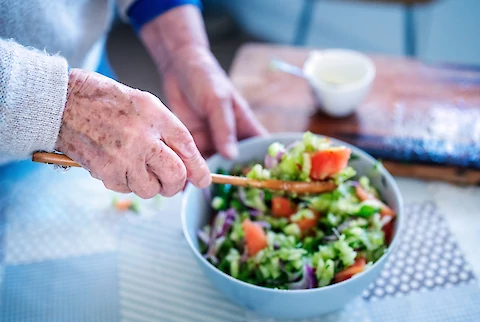
Maintaining optimal digestive health is a crucial part of senior wellness. A vital ingredient in achieving this is dietary fiber. As we age, the digestive system becomes more delicate. This requires a more cautious approach to diet for seniors under in-home care with dietary restrictions. Mastering the art of integrating fiber-rich foods into their meals is paramount for optimal health and well-being.
What is Fiber?
Fiber is a type of carbohydrate the body cannot break down. It’s either soluble or insoluble. Soluble fiber dissolves in water to form a gel-like material. It can help lower blood cholesterol and glucose levels. Insoluble fiber promotes material movement through the digestive system. To ensure senior digestive wellness, aim to incorporate soluble and insoluble fiber into your elderly loved one's diet.
Health Benefits of Fiber for Seniors
Besides promoting healthy digestion, fiber can help prevent constipation, which many seniors suffer from. Fiber can lower the risk of developing heart disease by reducing LDL (bad) cholesterol levels. It also supports healthy weight management, promoting feelings of fullness without adding excess calories. Some studies suggest that a high-fiber diet can lower the risk of certain types of cancer, including colon cancer.
Recommended Daily Fiber Intake for Seniors
The American Heart Association recommends an average dietary fiber intake of 25-30 grams daily for adults. Always do things gradually when increasing senior fiber intake. A sudden increase in fiber can cause bloating or gas. Drinking plenty of fluids is also critical. Fiber works best when it absorbs water, making stool soft and bulky.
Fiber-Rich Foods for Seniors
Fruits and vegetables like apples, oranges, and carrots are good fiber sources. It doesn’t hurt that they also contain essential vitamins and minerals, which seniors can benefit from. Whole-grain foods, beans, nuts, and seeds are also fiber-rich. Seniors with dietary restrictions or difficulties chewing or swallowing may find some raw fiber-rich foods challenging to consume. In this case, foods like cooked vegetables and canned fruits may be easier to consume.
Tips for Incorporating More Fiber into Senior Diets
You can incorporate more fiber into a senior's diet with minor changes to their meals. Consider replacing white bread with whole-grain loaves. Including more fruits and vegetables in meals can significantly increase fiber intake.
Variety is essential, so try to include different types of fiber-rich foods in the diet. You can make snacks fiber-rich, too. Snack options, like oatmeal, popcorn, and berry smoothies, are always worth exploring.
Try to introduce these changes gradually, monitor the senior's response, and adjust as necessary. Remember that each individual is different. What works well for one person might work better for another.
Get Support From Senior Helpers Metro Portland North
Fiber is integral in maintaining seniors' digestive health. Family caregivers should prioritize incorporating fiber-rich foods into their senior loved one’s diet to promote overall wellness.
If you’re in Portland, Beaverton, Hillsboro, Troutdale, or Multnomah County and need assistance with meal preparation for your senior loved one, Senior Helpers Metro Portland North can help. We provide professional in-home care to help seniors live fulfilling lives in their golden years. Contact us to learn more about our senior care services.